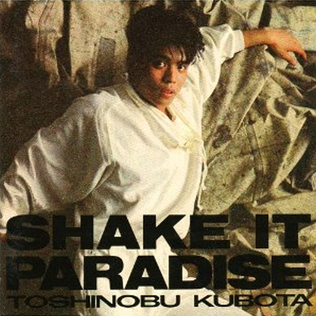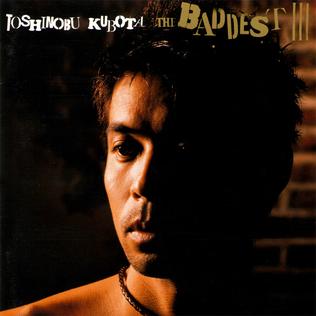Toshinobu "Toshi" Kubota is a Japanese singer, songwriter, musician, music producer, and radio personality. He has produced six million-seller records and thirty-three Top 40 singles during his career. Kubota is currently part of Sony Music Japan. In addition, he has composed and written songs for many singers including Hiromi Iwasaki, Misia, Toshinori Yonekura, Kyōko Koizumi, and many other recording artists.

"Yes Forever" is the nineteenth single by Japanese recording artist Misia. It was released on April 30, 2008 as the first single from Misia's ninth studio album Just Ballade.

"Yakusoku no Tsubasa" is the twentieth single by Japanese recording artist Misia. It was released on May 28, 2008 as the second single from Misia's ninth studio album Just Ballade.

"Ginga/Itsumademo" is the twenty-second single by Japanese recording artist Misia. It was released on June 10, 2009 as the third single from Misia's ninth studio album Just Ballade.

La La La Love Thang is the ninth studio album of Japanese singer Toshinobu Kubota, released on December 2, 1996. The album has been certified triple platinum by the Recording Industry Association of Japan. It was also successful in international music markets and yielded two singles: "Niji No Grand Slam" and "La La La Love Song". Kubota then embarked on his first international concert tour in 1996, which he titled the Oyeees! Tour. A live album, Toshinobu Kubota Concert Tour '96: Oyeees!, was released which featured footage from the tour. As of February 2012, La La La Love Thang has sold over 840,000 copies worldwide.
The discography of Japanese R&B singer Toshinobu Kubota consists of nineteen studio albums, ten compilation albums, two tribute albums, and over seventy singles. In 1985, Kubota signed with Sony Japan and began producing and writing songs for many of label's singers and groups. Under the label, Kubota released his first single, "Shitsui no Downtown" in June 1986, followed by "Time Shower ni Utarete" in December. Both songs were well received by radio, placing fifty-three and thirty-five on the Oricon Singles Chart. In September 1986, his debut album, Shake It Paradise, peaked at number twenty-two and remained on the Oricon Albums Chart for seven consecutive weeks. Shake It Paradise became certified million. The following year in 1987, Kubota's second studio album, Groovin', debuted at number thirty-three and was certified million. In February 1988, Kubota released "You Were Mine", which debuted at number two. In September 1988, Kubota released his third album, Such A Funky Thang!. The album peaked at number one and was certified million. The album also spawned the top-charted single "Dance If You Want It", which peaked at number three. In 1989, Kubota released his compilation album, The Baddest. The album also peaked at number one and was certified million.

Shake It Paradise is the first studio album of Japanese singer Toshinobu Kubota, released on September 10, 1986. Under the label, Kubota released his first single, "Shitsui no Downtown" in June 1986, followed by "Time" in December. Both songs were well received by radio, placing fifty-three and thirty-five on the Oricon Singles Chart. "Shake It Paradise" peaked at number twenty-two and remained on the Oricon Albums Chart for seven consecutive weeks. Shake It Paradise became certified platinum.

The Baddest is first compilation album of Japanese singer Toshinobu Kubota, released on October 8, 1989. The album peaked at number one and was certified million.

"La La La Love Song" is a song recorded by Japanese R&B singer Toshinobu Kubota for his ninth studio album, La La La Love Thang (1996). The song was written by Kubota and produced by Yoichiro Kakizaki.

"Funk It Up" is a song recorded by Japanese R&B singer Toshinobu Kubota for his eighth studio album, Sunshine, Moonlight (1995). The song was written by Kubota and produced by Kubota, Kim Burse, Camus Mare Celli.

Neptune is the sixth studio album by Japanese singer Toshinobu Kubota, released on July 1, 1992. The album charted at number 3 on the Oricon Monthly Albums chart and remained on the charts for total of 13 weeks. The album sold a total of 484,000 units, reaching double platinum certification.

Timeless Fly is the fifteenth studio album of Japanese singer Toshinobu Kubota, released on February 24, 2010. The album charted at number 9 on the Oricon Albums chart and remained on the charts for total of 26 weeks. The album sold over 16,063 units in Japan.

The Baddest II is a compilation album of Japanese singer Toshinobu Kubota. The album released on September 22, 1993, summing up various singles from Kubota. The album peaked at number one and spent twenty-three weeks on the Oricon Weekly Albums chart. The album became certified triple platinum, selling over 791,000 copies in Japan.

The Baddest III is a compilation released by Japanese singer Toshinobu Kubota, on December 4, 2002. The album charted at number 3 on the Oricon Weekly Albums chart and stay on the charts for a total of eighteen weeks. The album also sold over 316,000 units in Japan.

The Baddest: Hit Parade is a compilation released by Japanese singer Toshinobu Kubota. This album was released in Japan at the end of November 2011 to commemorate the twenty-fifth anniversary of Kubota's music. The album charted at number 2 on the Oricon Weekly Albums chart and remained on the charts for a total of 38 weeks. The album became certified platinum, selling over 351,049+ units in Japan.

"Love Rain (Koi no Ame)" is a song recorded by Japanese R&B singer Toshinobu Kubota for his compilation album, Love & Rain: Love Songs (2010). The song was released on June 6, 2010, as the lead single from the album.
Toshinobu is a masculine Japanese given name.

"Anata o Tamotsu Mono" is a song recorded by Japanese singer Maaya Sakamoto and Japanese musician Cornelius. It was released as a double A-side single alongside the song "Mada Ugoku" by FlyingDog on June 17, 2015. It was written by Shintaro Sakamoto of the band Yura Yura Teikoku and composed by Cornelius, who produced and arranged the track as well as playing all the music. The song served as the opening theme to the Tokyo MX anime Ghost in the Shell: Arise - Alternative Architecture.
"Mada Ugoku" is a song recorded by Japanese singer Maaya Sakamoto and Japanese musician Cornelius. It was released as a double A-side single alongside the song "Anata o Tamotsu Mono" by FlyingDog on June 17, 2015. It was written by Shintaro Sakamoto of the band Yura Yura Teikoku and composed by Cornelius, who produced and arranged the track as well as playing all instruments. "Mada Ugoku" is the theme song to the animated film Ghost in the Shell: The New Movie.

Follow Me Up is the ninth studio album by Japanese singer Maaya Sakamoto. It was released on September 30, 2015, through FlyingDog. The limited edition came with a DVD including the music videos for the singles "Hajimari no Umi", "Be Mine!", "Replica" and "Shiawase ni Tsuite Watashi ga Shitte Iru Itsutsu no Hōhō".















